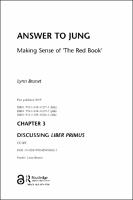Chapter 3 Discussing Liber Primus
Proposal review
Abstract
In 1912 Jung began to have a series of dreams which left him with a sense of disorientation and inner pressure but he could think of nothing in his life that would have caused this. This chapter addresses each of the entries in Liber Primus and relates them to particular high degrees of Freemasonry. The first entry, The Way of What is to Come, was written in retrospect in July 1914 and is an overview of the rest of the entries in Liber Primus. This entry acts as an introduction to the fantasies where Jung personifies two distinct driving forces behind his knowledge and experience: ‘the spirit of this time’, by which he means scientific rationalism, and ‘the spirit of the depths’. In Jung’s entry there is a heavy emphasis on the role of the child and particularly on the concept of the divine child.
Book
Answer to JungKeywords
Jung; unconscious; depth psychology; analytical psychology; Liber Primus; The Red Book; Freemasonry; dreams; dreaming; fantasies; divineDOI
10.4324/9780429458262-3ISBN
9781138312371, 9781138312395, 9780429458262Publisher
Taylor & FrancisPublisher website
https://taylorandfrancis.com/Publication date and place
2019Imprint
RoutledgeClassification
Psychology
Psychological theory, systems, schools and viewpoints
Analytical and Jungian psychology
Psychoanalytical and Freudian psychology


 Download
Download